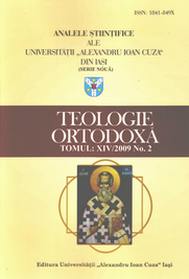The Capadocians and the Present Orthodox Church on the Place of Humanity in Creation
The Capadocians and the Present Orthodox Church on the Place of Humanity in Creation
Author(s): Elena Drăghici-VasilescuSubject(s): Christian Theology and Religion
Published by: Editura Universităţii »Alexandru Ioan Cuza« din Iaşi
Keywords: Capadocian School; St Basil the Great Creation; St. Gregory of Nyssa humankind
Summary/Abstract: In the multitude of theories about the relationship between evolution and creation, those which assert that the two are not contradictory are, in fact, the smallest in number. That is surprising given the fact that the primary sources of both movements do not suggest anything to sustain an incompatibility between these two views. On the one hand, Genesis (I,11) says: “Let the earth bring forth grass!” (but not ‘God created grass’). It means that the earth, and matter in general, was endowed with creativity, and that can imply evolution. Along the same lines of thought as those in the book quoted above, the thinkers of the early Christian era continue: “The earth germinates. It does not, however, sprout that which it has, but transforms [...] as much as God gives to it the strength to act” (St Basil the Great). Earth is unable to be fertile by itself, but the Word of God intervenes with its active power to make it so; yet the role of the earth is important in the equation. Even more so is that of humankind. On the other hand, Charles Darwin himself writes at the end of his The Origins of Species: There is grandeur in this view of life, with its several powers, having been originally breathed into [by the Creator] into a few forms or into one; and that, whilst this planet has gone on cycling on according to the fixed law of gravity, from such so simple a beginning endless forms, most beautiful and most wonderful have been, and are being, evolved. My paper would be a call to rechecking these primary sources when any debate on the above topic takes place.
Journal: Analele Ştiinţifice ale Universităţii »Alexandru Ioan Cuza« din Iaşi. Teologie Ortodoxă
- Issue Year: 2009
- Issue No: 2
- Page Range: 57-66
- Page Count: 10
- Language: English

